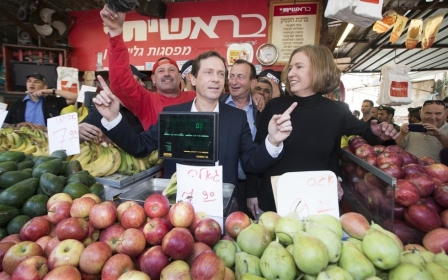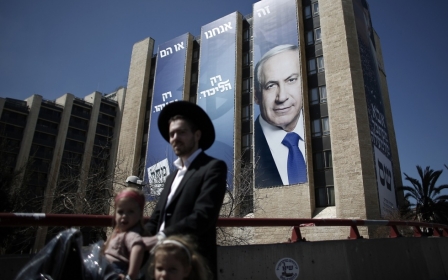Netanyahu in late bid for centre votes

Israel’s prime minister changes track as polls show centre-left parties pulling ahead two days before vote.
Two days before the Israeli election, slated for Tuesday, Prime Minister Benjamin Netanyahu seems to be changing his rhetoric in an attempt to bolster his appeal to centrist voters.
The latest polls indicate that the centre-left Zionist Union, headed by Labor Minister Isaac Herzog and former justice minister Tzipi Livni, have pulled ahead of Netanyahu’s right-wing Likud party by as much as four seats.
Netanyahu’s election campaign has been concentrated on the issue of national security, but many commentators view the vote as a referendum on his six years as a premier. Netanyahu’s fixation on security may have backfired, as the Israeli public has shown more concern about the high cost of living and the state’s housing crisis.
Netanyahu on Sunday promised the leader of the centre-right Kulanu, Moshe Kahlon, the position of finance minister should he get re-elected as prime minister.
Netanyahu told Army Radio: “However many seats his party wins, he will get the post of finance minister.”
But Kahlon rebuffed Netanyahu’s offer, saying that this wasn’t the first time the latter made promises he couldn’t keep and describing Netanyahu’s offer as a “pre-election spin”.
“Netanyahu had already promised me the Israel Lands, Administration and the Finance Ministry in the past, but he did not keep [his word],” said Kahlon, who used to be a popular Likud member before breaking away to form his own party.
Under Israel’s electoral system, the task of forming a new government does not automatically fall to the party with the largest number of votes.
The winner - and next prime minister - will be the one who can succeed in putting together a coalition commanding a parliamentary majority.
Kahlon, whose party is expected to win between eight and to 10 seats, could be left playing the role of kingmaker following Tuesday’s vote. His election campaign focused almost entirely on economic issues, particularly the housing crisis, which is a key issue for voters. The Arab List – made up of parties representing Palestinian citizens of Israel – and Yair Lapid’s Yesh Atid Party are forecast to get up to 15 and 12 respectively and could also sway the government formation process.
Isaac Herzog capitalised on Kahlon’s snub and wrote on his Facebook page: “When Bibi [Netanyahu] goes down in the polls, he ups the lies. He is panicking again and this time promised Kahlon the finance ministry, but nobody believes him anymore.”
Netanyahu has accused unspecified foreign governments of funnelling millions of dollars to opposition activists working to undermine him and help boost the Zionist Union. Herzog and Livni both dismissed the claims, saying that the premier was trying to distract the Israeli public from the real socio-economic issues at hand.
Over the past few days, Netanyahu has suddenly given in to a blitz of interviews - a marked contrast from the tight-lipped approach that marked the majority of his election campaign.
Netanyahu has also been busy reaching out to former Likud supporters and plans to attend a right-wing rally at Rabin’s Square in Tel Aviv on Sunday night.
Organisers said the rally was to strengthen all parties supportive of settlements and ensure the election of a government that would “bravely withstand pressures from the world”. Naftali Bennett, head of the ultra-nationalist Jewish Home party, is also expected to speak.
Middle East Eye propose une couverture et une analyse indépendantes et incomparables du Moyen-Orient, de l’Afrique du Nord et d’autres régions du monde. Pour en savoir plus sur la reprise de ce contenu et les frais qui s’appliquent, veuillez remplir ce formulaire [en anglais]. Pour en savoir plus sur MEE, cliquez ici [en anglais].




